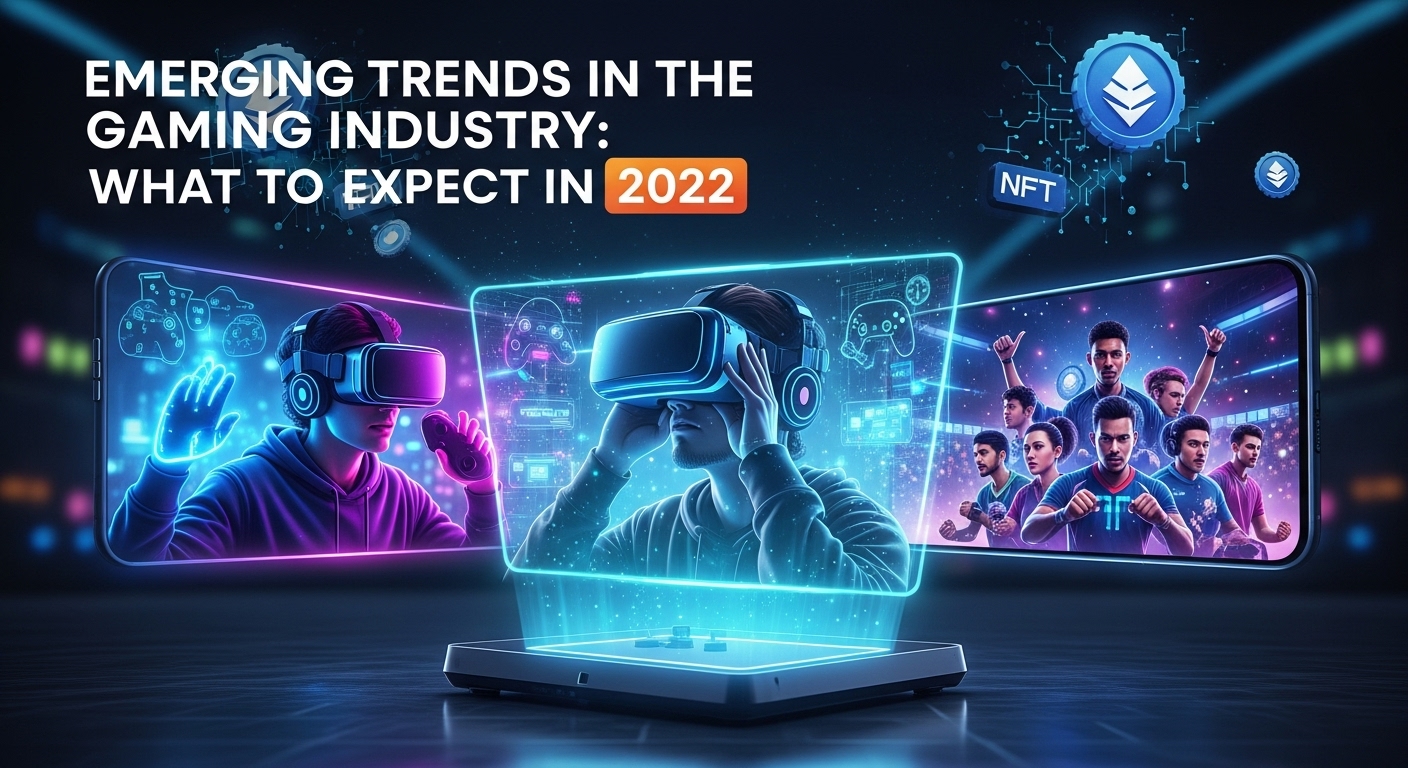
Emerging Trends in the Gaming Industry: What to Expect in 2022
The gaming industry is a rapidly evolving landscape that continues to push the boundaries of technology and entertainment. As we progress through 2022, several emerging trends are set to shape the future of gaming. From the rise of cloud gaming to the integration of virtual reality, these innovations promise to redefine how we play, interact, and experience games. In this article, we’ll explore these trends in detail, providing insights into what gamers and industry insiders can expect in the coming months.
Cloud Gaming: The Future of Accessibility
Cloud gaming has been one of the most talked-about developments in the gaming industry. This technology allows players to stream games directly from the cloud to their devices without the need for expensive hardware. Companies like NVIDIA and Google Stadia are leading the charge, offering services that enable gamers to access high-quality games on a variety of platforms.
The appeal of cloud gaming lies in its accessibility. Gamers no longer need to invest in high-end PCs or consoles to enjoy the latest titles. Instead, they can stream games to their smartphones, tablets, or smart TVs, making gaming more inclusive than ever before. As internet speeds continue to improve globally, cloud gaming is expected to become more mainstream, with more companies entering the market.
Virtual Reality: Immersive Experiences
Virtual reality (VR) is another area where the gaming industry is seeing significant growth. VR technology has made great strides in recent years, with more affordable and accessible headsets like the Oculus Quest 2 bringing immersive gaming experiences to a wider audience. These advancements in VR hardware and software are creating new opportunities for game developers to craft innovative and engaging experiences.
The potential for VR in gaming goes beyond just entertainment. It offers unparalleled immersion, allowing players to step into the shoes of their favorite characters and explore fantastical worlds in ways that traditional gaming cannot match. With the continued development of VR technology, we can expect even more sophisticated and realistic gaming experiences in the future.
The Rise of Esports
Esports has seen explosive growth over the past few years, and 2022 is poised to be another landmark year for competitive gaming. With millions of fans worldwide and lucrative prize pools, esports is becoming a mainstream entertainment option. Major events like The Game Awards and international tournaments attract massive viewership, rivaling traditional sports in popularity.
As the esports industry continues to mature, we can expect more professional leagues, sponsorship deals, and investment from major brands. This growth will also bring more structure and regulation to the industry, ensuring fair play and creating a sustainable ecosystem for players and teams. Additionally, the integration of technologies like VR and AR could enhance the spectator experience, making esports even more engaging for fans.
Blockchain and NFT Integration
One of the most controversial yet intriguing trends in gaming is the integration of blockchain technology and non-fungible tokens (NFTs). Blockchain offers a decentralized platform for game developers to create unique digital assets that players can buy, sell, and trade. NFTs, on the other hand, provide a way to own unique in-game items and collectibles, adding a new layer of value and rarity to game economies.
While the use of blockchain and NFTs in gaming is still in its infancy, it has the potential to revolutionize how players interact with virtual worlds. Games like Axie Infinity have already demonstrated the potential of play-to-earn models, where players can earn real-world value through their in-game activities. As this technology evolves, we can expect more games to explore these possibilities, offering players new ways to engage with their favorite titles.
Cross-Platform Play and Social Gaming
Another trend gaining momentum is cross-platform play, which allows gamers to play with friends across different devices and platforms. This trend is breaking down the barriers between console, PC, and mobile gaming, creating a more unified and inclusive gaming community. Titles like Fortnite have popularized this feature, enabling players to connect with friends regardless of their preferred gaming device.
Social gaming is also on the rise, with more games incorporating social features and multiplayer modes. These games encourage interaction and collaboration, fostering a sense of community among players. As developers continue to focus on creating social experiences, we can expect more games to integrate features that promote communication and cooperation among players.
Takeaways
The gaming industry is poised for exciting changes in 2022, with emerging trends that promise to reshape how we play and interact with games. From the accessibility of cloud gaming to the immersive potential of VR, these innovations are setting the stage for a new era of gaming experiences. As esports continues to gain traction and blockchain technology opens new opportunities, players and developers alike have much to look forward to. The future of gaming is bright, and these trends are just the beginning of what’s to come.
Artificial Intelligence in Gaming
Artificial Intelligence (AI) is increasingly becoming a cornerstone of gaming development and design. AI is not just about creating smarter NPCs (non-player characters) but also about enhancing the overall gaming experience by making it more dynamic and responsive. Advanced AI techniques are being used to adjust the difficulty level of games in real-time, creating a customized experience for each player. This personalization can keep players engaged longer, as games can adapt to their skill levels and preferences.
Moreover, AI is being leveraged to create more lifelike environments and characters, enhancing the realism and immersion of games. Developers use AI to build complex storylines that can change based on player decisions, offering a more interactive narrative experience. As AI continues to evolve, we can expect even more sophisticated applications in gaming, possibly including AI-driven game development tools that assist creators in designing more intricate game worlds.
Increased Focus on Diversity and Inclusion
The gaming community is becoming more diverse, and game developers are taking note. There is a growing emphasis on creating games that reflect this diversity, both in terms of character representation and storylines. Developers are prioritizing inclusivity, making sure that players of all backgrounds can see themselves reflected in the games they play.
This trend extends beyond character design; it influences the narratives and themes explored in games. Titles are increasingly tackling social issues, offering players a platform to explore complex topics in a safe and interactive environment. As this focus on diversity and inclusion continues to grow, we can expect to see more games that not only entertain but also educate and inspire players from all walks of life.
Impact of the Pandemic on Gaming Habits
The COVID-19 pandemic has left a lasting impact on the gaming industry, reshaping how people engage with games. With more people staying at home, gaming has become a primary source of entertainment and social interaction. This surge in gaming activity has accelerated the adoption of digital distribution platforms and online multiplayer games.
Developers have responded by creating more content tailored to remote play and social interaction. Games that offer cooperative modes, virtual hangouts, and live events have gained popularity, allowing players to stay connected with friends and family. The pandemic has also heightened interest in wellness-focused games, which offer relaxation and stress relief during challenging times.
The Future of Game Development
With all these trends converging, the future of game development looks promising. Developers are exploring new ways to harness technology and creativity to deliver unique gaming experiences. The rise of independent game studios has also democratized the industry, allowing for more innovative and niche games to reach a broader audience.
Additionally, the push towards sustainability is influencing game development, with studios adopting eco-friendly practices in their production processes. This shift not only benefits the environment but also appeals to a growing segment of eco-conscious gamers. As technology continues to advance, game developers will have more tools at their disposal to create engaging, sustainable, and inclusive games.
Conclusion: Embracing the Future of Gaming
The gaming industry is on the cusp of a transformative period, with 2022 set to be a pivotal year. The integration of cutting-edge technologies like cloud gaming, VR, AI, and blockchain is reshaping the landscape, offering players unprecedented levels of immersion and interactivity. At the same time, the industry’s commitment to diversity and sustainability is paving the way for a more inclusive and responsible future.
As we look forward to these exciting developments, it’s clear that the gaming industry is not just about entertainment. It’s a dynamic and evolving space that reflects broader societal trends and technological advancements. For gamers, developers, and industry stakeholders, embracing these emerging trends will be key to thriving in this new era of gaming.







